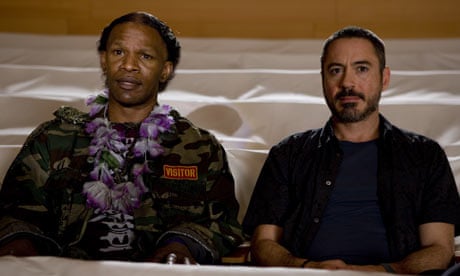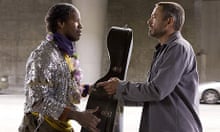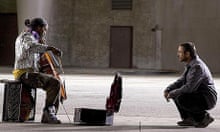Steve Lopez is living a reality most journalists only fantasise about. Four and a half years ago he wrote a column for the Los Angeles Times which, at least at the time, he thought was little different from the hundreds of others he had produced in his long and fertile career. But the column, about a homeless musician who once attended the prestigious Juilliard School in New York, hit an extraordinary chord in his readers.
Nathaniel Ayers presented a remarkably compelling story – here was a man with an almost preternatural gift for music, struck at an early age by schizophrenia and reduced to a life of quiet despair, despite his undiminished talent, on the streets of LA's Skid Row.
So Lopez got to know the man better and wrote more columns. Then his agent pressed him to write a book proposal. Then, even before the book contract was signed, Hollywood came calling, including an offer from none other than Steven Spielberg. Such is the trajectory of The Soloist, at this point a bestselling book in the US and also a movie, starring Robert Downey Jr as a fictionalised version of Lopez and Jamie Foxx as Ayers.
But if Lopez is aware of being among the blessed of his profession, it certainly has not gone to his head. Certainly, his life has changed dramatically as his relationship with Ayers has deepened, but it does not include any of the usual Hollywood cliches such as lolling in whirlpool baths with starlets or driving to the beach in an open-top BMW.
Rather, he feels humbled – and, often, exhausted – by the experience of becoming a mentor and friend to this man. Ayers still takes up an extraordinary amount of his time and emotional energy. If Lopez is not pressing him to take pills to help his digestion or sorting out some practicality at his small apartment, he is driving him around town to repair or add to his now dazzling collection of musical instruments, taking chunks out of his working day that he then has to make up by staying in the office until nine or 10 at night.
"I've aged quite a bit in the last five years," he says, from the cramped confines of his cubicle on the third floor of the LA Times building. "I've been so busy, I've never stopped to let it all sink in." As we talk, Lopez plays with a set of worry beads he bought in Greece – a habit he says he resorts to with particular intensity when his troubled newspaper is threatening another round of job cuts.
Ayers, for sure, is a responsibility as well as a story subject. At first, Lopez felt it was not fair to throw him into the limelight and then ignore him. He relied on him, too, to provide him with more material as his relentless column deadlines kept pressing. Then, as time went on, Ayers became more like a relative than an interview subject or a source – a person Lopez took on, a little out of obligation, and a little out of a sense of peculiar personal fulfilment.
Now, he says, he can't imagine life without him. "It sounds so selfish," he says with characteristic candour, "but I like the fact that he makes me feel better about myself … It feels good to be sacrificing time and energy to be friends with a guy who really appreciates it, and who shows it in so many ways."
They have become improbable buddies not just in a superficial movie-pitch sense, but a genuine odd couple, who bicker and banter and worry about each other like a pair of old guys on a New York park bench.
The day before we met, Lopez had taken Ayers first to one music shop and then another, ostensibly to get a pad repaired on his flute. The second shop was one Ayers had not visited before and soon he was begging Lopez to let him try out a trumpet. "I think I'm in heaven," he swooned.
Two hours later, they left the store with a brand new trumpet, a new trombone, and a music book for both the trumpet and a viola. (Ayers has plenty of money now, thanks to his improbable fame; he relies on both Lopez and his sister to manage his funds and help him enjoy and extend his passion for music.)
Lopez, at this point in the proceedings, was running late for an interview at the LA farmer's market, so he made a snap decision to take Ayers with him. That, too, was not without complication: a security guard came over and told Ayers he could not play the flute in public. Lopez was nervous about his response – there are times when his friend, due to his mental health problems, can become belligerent.
"And so a two-hour outing turned into six hours," he recounted with a smile and a hint of a sigh. "Just another typical day with Nathaniel."
This is not, to put it mildly, where Lopez imagined he would end up five years ago, when he was just a laconic, laidback, wrily humorous columnist extracting drops of humanity from the concrete morass of metropolitan LA. His journalistic heroes were big-city columnist such Jimmy Breslin in New York or Mike Royko in Chicago, guys who could wrest 800 compelling words out of a man crying into his beer over the wife who had just left him.
Lopez was certainly inventive. One day, despairing at the sight of thousands of unopened reader letters in boxes around his desk, he opened one at random and wrote a column about the writer – a man from the San Gabriel Valley who sat for hours at his kitchen table obsessively compiling a personal history.
Then, in April 2005, he took a walk in Pershing Square, a small park in downtown LA known down the decades as the hangout of pimps and rent-boys, and stopped at the sight of a dishevelled black man of about his age playing a tattered violin with only two strings. He was curious enough to stop and talk to the man, who was clearly deranged, but referred, strikingly, to his old classmates at Juilliard.
Lopez checked the man's name and discovered he had indeed attended the prestigious academy – along with the likes of Yo Yo Ma – before suffering a mental breakdown and joining the ranks of the rejected and dispossessed.
Lopez never thought he would write more than one column about the man. He assumed Skid Row was an uncomfortable subject most readers would not like to dwell on. As he put it: "Nobody wants to be reminded of huge, intractable social problems."
But the response was little short of flabbergasting. Readers flooded Lopez with mail, most of it glowingly positive. A music company president sent a violin and a cello in the mail for Ayers
And that was only the beginning. Over the next few months, Lopez spent a night on the streets to find out for himself what it was like, introduced Ayers to sheltered housing on Skid Row (with slow and uncertain results) got him to perform in a nightclub (ditto) and accompanied him to a concert at Disney Hall. He met and made friends with several members of the LA Philharmonic, who envied his pure relationship with music, unsullied by professional anxieties or political in-fighting. He reunited more than once with Yo Yo Ma, seeing him most recently at a performance at the Hollywood Bowl outdoor amphitheatre.
A copy editor at the LA Times, Saji Mathai, told Lopez he had found his very own Joe Gould – Gould being a larger-than-life Greenwich Village street-dweller from the 1940s who worked feverishly for years on his supposed masterwork and became the all-consuming subject of New Yorker writer Joseph Mitchell. (That story also became a film, Joe Gould's Secret, starring Ian Holm and Stanley Tucci.)
But in Lopez's view, Ayers was always more than just one guy with a story to tell. "I was told early on that this was a rare opportunity to humanise thousands just like him," Lopez said. "This story took me into a whole world, a world so close to this building and to City Hall." (Skid Row covers roughly 50 city blocks just minutes away from the big-business high-rises of downtown LA.)
"Without him, without the evolving drama of his life, nobody would have cared about the public policy part of it."
As the weeks stretched out into months and years, Lopez became both an expert and an advocate for mental health issues, homelessness and more besides. Even before the book was published, he was in high demand on the lecture circuit. He agreed to speak, not because he wanted the attention, but because he felt a special responsibility.
The same was true about agreeing to the movie project – and agreeing to have Robert Downey Jr play a much more insecure, lonely character than he is in person. The differences between the real Lopez and the fictional one are striking, and more than a little jarring. For a start, the real Lopez is married, to an extremely understanding wife who has put much of her own writing career on hold to make room for his. In the film, he is depicted as a divorcee with little sense of his life's direction until he meets Ayers.
"There were times when I wondered if wanted to proceed," he acknowledged. "There was so much to juggle, and I was concerned how Nathaniel would handle it all. But it was all part of what I was doing – trying to make a difference, to take hold of a cause. It was a rare opportunity to share what I've learned."
Ayers became ill a long time ago and is only slowly showing signs of improvement – starting with an acknowledgement, which the film helped him make, that he is sick and that his condition is called schizophrenia. Music is clearly the key to his sanity – he loves trying new instruments and breaking new barriers. In Lopez's words, he exudes a glow and a sense of peace when he is engaged with it.
Still, he retains a deep-seated fear of taking medicine, stemming from a time when he underwent shock therapy as a young man. Lopez and the other carers in Ayers' life are even now grappling with the question of how to get him on to anti-psychotic drugs.
Lopez is not without his demons himself, as he confides, almost unprompted, as the interview nears its end. Clinical depression runs in his family. To him, reaching out to Ayers is a way to make up for things he did not do in his past. "In my own family it was difficult for me to make a difference," he said. "We had so much history, so many walls. Nathaniel and I have no long history of disappointment and heartbreak, so it's easier to help him than my own family."
"Maybe in some way this is what this is for me – a way to make amends. I think of all the things I could or should have done in my life. Now I'm finally doing the right thing for somebody."



